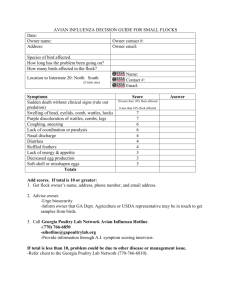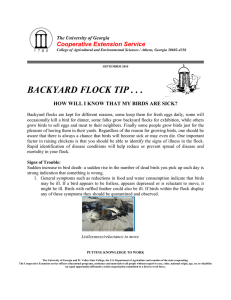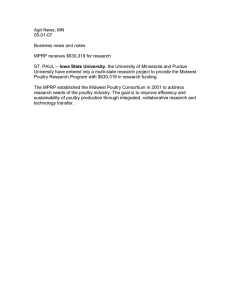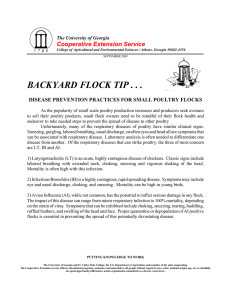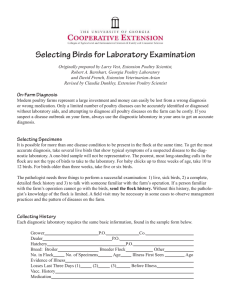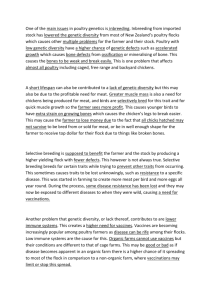BACKYARD FLOCK TIP . . . Cooperative Extension Service
advertisement
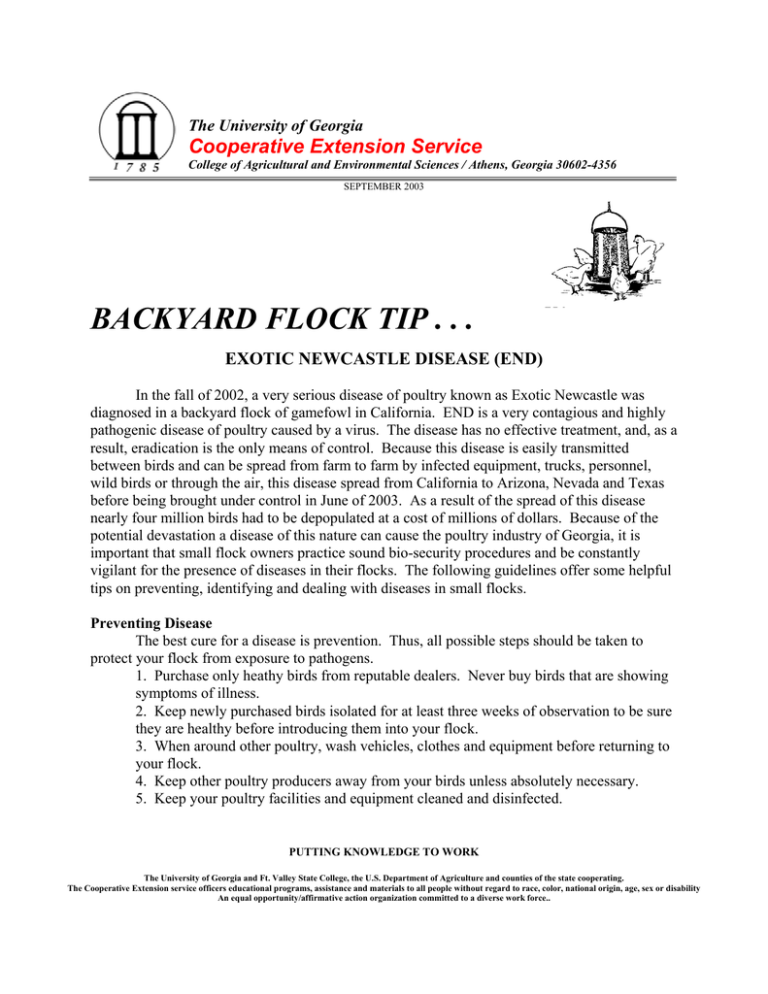
The University of Georgia Cooperative Extension Service College of Agricultural and Environmental Sciences / Athens, Georgia 30602-4356 SEPTEMBER 2003 BACKYARD FLOCK TIP . . . EXOTIC NEWCASTLE DISEASE (END) In the fall of 2002, a very serious disease of poultry known as Exotic Newcastle was diagnosed in a backyard flock of gamefowl in California. END is a very contagious and highly pathogenic disease of poultry caused by a virus. The disease has no effective treatment, and, as a result, eradication is the only means of control. Because this disease is easily transmitted between birds and can be spread from farm to farm by infected equipment, trucks, personnel, wild birds or through the air, this disease spread from California to Arizona, Nevada and Texas before being brought under control in June of 2003. As a result of the spread of this disease nearly four million birds had to be depopulated at a cost of millions of dollars. Because of the potential devastation a disease of this nature can cause the poultry industry of Georgia, it is important that small flock owners practice sound bio-security procedures and be constantly vigilant for the presence of diseases in their flocks. The following guidelines offer some helpful tips on preventing, identifying and dealing with diseases in small flocks. Preventing Disease The best cure for a disease is prevention. Thus, all possible steps should be taken to protect your flock from exposure to pathogens. 1. Purchase only heathy birds from reputable dealers. Never buy birds that are showing symptoms of illness. 2. Keep newly purchased birds isolated for at least three weeks of observation to be sure they are healthy before introducing them into your flock. 3. When around other poultry, wash vehicles, clothes and equipment before returning to your flock. 4. Keep other poultry producers away from your birds unless absolutely necessary. 5. Keep your poultry facilities and equipment cleaned and disinfected. PUTTING KNOWLEDGE TO WORK The University of Georgia and Ft. Valley State College, the U.S. Department of Agriculture and counties of the state cooperating. The Cooperative Extension service officers educational programs, assistance and materials to all people without regard to race, color, national origin, age, sex or disability An equal opportunity/affirmative action organization committed to a diverse work force.. Identifying Disease. Most poultry diseases have common symptoms and, therefore, can not generally be identified merely by observation. Accurate diagnosis is imperative for effective treatment and most often requires a poultry veterinarian to determine the type of disease and treatment necessary. 1. Observe your birds regularly for symptoms such as coughing, wheezing, ruffled feathers, listlessness, diarrhea and unusual mortality. 2. Should disease symptoms occur it is best to take several sick birds to the nearest poultry diagnostic lab. Birds submitted to the lab will be killed to conduct a necropsy to determine the cause of illness. 3. Georgia currently has nine poultry diagnostic labs scattered around the state. Your local County Extension office can direct you to the nearest poultry diagnostic lab or you can call the Georgia Poultry Lab headquarters at 770-535-5996. Dealing with a Disease Condition. 1. Once the diagnostic lab has determined the disease condition of your flock, the veterinarian conducting the examination can advise you on the appropriate steps to treat or eliminate the disease. 2. Follow the Veterinarians directions closely. 3. Should you chose not to submit birds to a diagnostic lab, sick birds should be removed from the flock and preferably destroyed. If disease conditions persist, it is likely that the entire flock may have to be depopulated and the premises cleaned and disinfected before purchasing new birds. 4. When experiencing disease conditions in your flock do not visit other poultry operations or sell your birds to other individuals. Poultry diseases have the potential to be very costly to poultry producers in Georgia as well as being difficult to deal with emotionally. Small flock producers should keep in mind that as attached as they may be to their birds and the personal costs that may be associated with depopulation, the cost of inaction could lead to millions of dollars in damage through the spread of a highly contagious and virulent disease. Dan L. Cunningham Extension Coordinator-Poultry Science County Extension Coordinator/Agent
